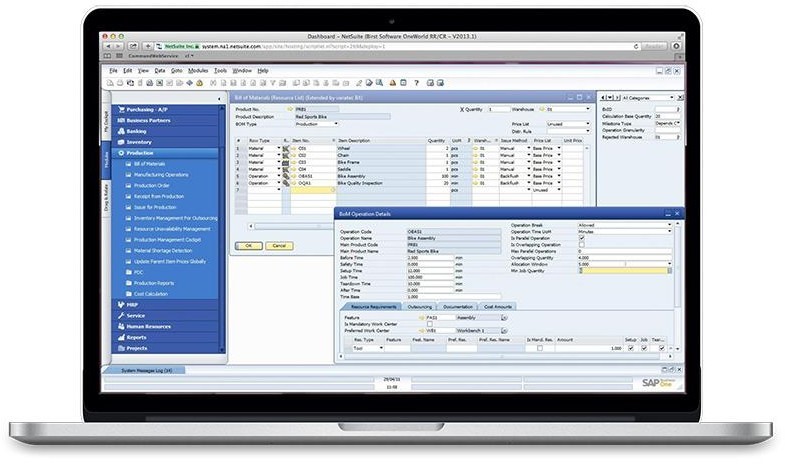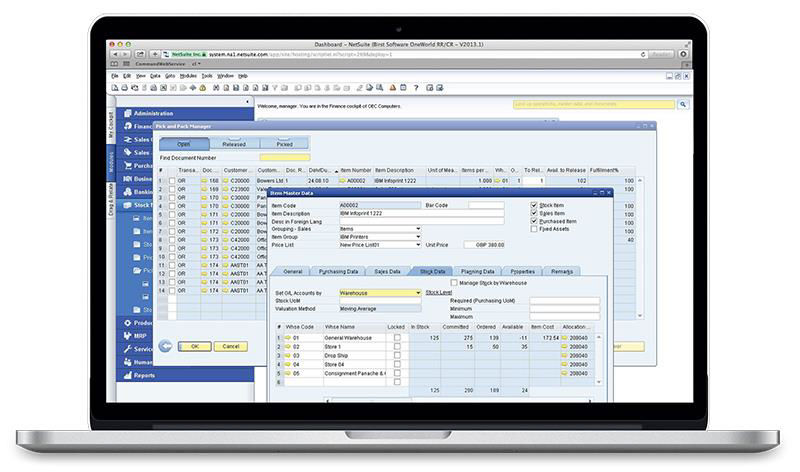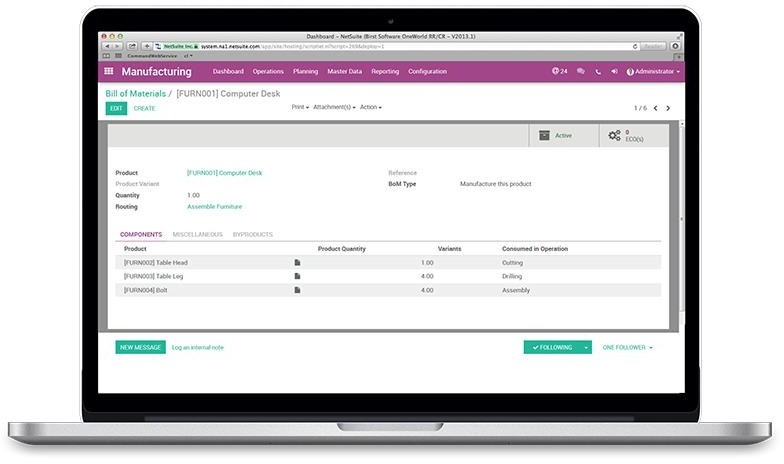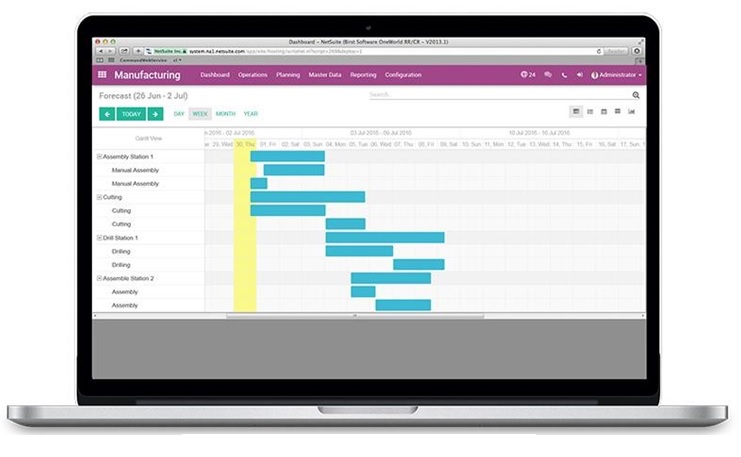Introduction
Introducing ERP offers available today
In the last 15 years, new technologies have pushed enterprises both large and small to rethink their process management with respect to the new dynamics created by the changing business landscape. Implementing an ERP is a step many businesses are taking to help organize and optimize the way they do business.
There are many business software offerings currently available on the market, however, most are focused solely on the needs of large enterprises. This document aims to give you a good idea of the features offered by the main ERP solutions for SME’s, with an emphasis on cloud-based solutions.
A cloud-hosted ERP solution offers a number of advantages over a traditional ERP that is installed locally, many of which are especially relevant to small businesses. A cloud-based ERP is often more flexible and able to adapt to a growing and changing business. Most of the time, startup and maintenance costs are much lower as well because they are included in the license fee.
Feature Comparison
In order to offer a fair comparison, we have compiled a table of the most important features into ten categories: Sales, Customer Relationship Management, Accounting & Finance, Marketing, Warehouse Management, Manufacturing, Purchasing, Services & Projects, Human Resources, and Usability & Productivity.
These categories encompass almost everything an SME might need to manage, develop, and evolve its business operations. The three products analyzed have extra third-party apps, developed by partners. Both NetSuite and Odoo have a public app store. Microsoft Dynamics NAV however has no app store; you will have to contact each partner individually in order to get information about their extra modules. As these modules usually come at an additional cost (license fees and/or implementation service), we only reported features that are in the standard package within our analysis. We have also included a comprehensive list of the pricing conditions to better weigh the costs/benefits for each solution.
We will finalize this document with some observations on market trends and customer satisfaction as well as provide input on a more global solution for SME’s.
Choosing the Right Software
Whether you are outgrowing entry-level software or replacing a legacy system, choosing an ERP that is a good fit for your company can have a strong impact on your future growth and profitability. Because the cost of implementing an ERP is so high, demanding a great deal of time and input from employees across your organization as well as potentially significant software licensing and consulting fees, there is tremendous pressure to get it right the first time.
Despite these high stakes, most decision makers selecting and implementing ERP software will not do so more than a few times in their career. The purchasing relationship is therefore tilted in favor of the vendor, with many vendors requiring hours of qualification before revealing crucial details such as features and pricing. When dealing with vendors, it is, therefore, essential to accurately and completely communicate the needs of your organization to avoid finding out 6 months into an implementation that the project isn’t feasible or that unexpected and expensive custom development is required.
Cloud or On-Premises?
In recent years there has been a trend in business software towards a software as a service (SaaS) model. Most major business software vendors, ERP or otherwise, have begun offering their locally installed products in a cloud-hosted version to provide additional flexibility. When deploying a cloud-based software, there is no need for a local server or other network hardware as data is managed and processed on a secure off-site server which, depending on the size of the deployment, can significantly reduce the initial cost of a system. This can make a cloud solution a better choice for small and medium-size businesses with less capital.
Inventory Management
| Features | Odoo | SAP Business One | Microsoft Dynamics AX |
|---|---|---|---|
| General | |||
| Multi-Warehouse | |||
| Storage Locations(Bins) | |||
| Bin Replenishment | |||
| Mobile Device Support | |||
| Multi-Company | |||
| Multi-Currency | |||
| Multi-Language | |||
| Automatic ASN (Advanced Shipping Notice) | |||
| Package Management/Cartoning | |||
| Freight Carrier Integration | |||
| Manage Consignee Stocks | |||
| EDI(Electronic Data Interchange) | |||
| Products | |||
| Non-Stocked Inventory | |||
| Multiple Variants | |||
| Multiple Unit of Measure | |||
| Inter-Class UoM Conversion* | |||
| Variant Matrix | |||
| Traceability | |||
| Lots/Serials | |||
| Up/Down Traceability | |||
| 360 ° Traceability | |||
| Expiration Dates | |||
| Cycle Counting | |||
| Reporting | |||
| Inventory Forecast | |||
| Inventory Valuation | |||
| ABC Analysis | |||
| Barcode Support | |||
| QR Code Support | |||
| RFID Support | |||
| Lots/Serial Number | |||
| Receptions | |||
| Picking | |||
| Internal Moves | |||
| Delivery Orders | |||
| Inventory Adjustments | |||
| Routing | |||
| FIFO/LIFO | |||
| Customizable Routes | |||
| Putaway Strategies | |||
| Wave Picking | |||
| Batch Picking | |||
| Zone Picking | |||
| Cluster Picking | |||
| Cross – Docking | |||
| Putaway Location Size, Weight & Capacity |
Supply Chain
| Features | Odoo | SAP Business One | Microsoft Dynamics AX |
|---|---|---|---|
| Features | |||
| Vendor Data Management | |||
| Vendor Pricelist Management | |||
| Inbound Quality Control | |||
| Drop shipping | |||
| Purchases | |||
| Purchase Requests | |||
| Purchase Orders | |||
| Purchase Approval Workflow | |||
| Request for Quotations | |||
| Contracts/Purchase Agreements | |||
| Automated Procurements | |||
| Minimum Stock Rules | |||
| Make–to–Order | |||
| Master Production Schedule |
Manufacturing
| Features | Odoo | SAP Business One | Microsoft Dynamics AX |
|---|---|---|---|
| Master Data | |||
| Multi-Level BoM | |||
| ByProducts/CoProducts | |||
| Routings | |||
| Sub-Assemblies | |||
| One BoM for Multiple Product Variants | |||
| BoM Versions | |||
| Multiple BoM/Planning | |||
| Planning | |||
| Demand Forecasting | |||
| MRP I Scheduler | |||
| MRP II Scheduler | |||
| Master Production Schedule | |||
| Gantt Chart Scheduling with Drag & Drop | |||
| Kanban Planning | |||
| Production Calendar | |||
| Infinite Capacity Planning | |||
| Finite Capacity Planning | |||
| Available to Promise | |||
| Multiple Scheduling Plans | |||
| Delivery Date Calculation (Backwards Scheduling) | |||
| Production Order Splitting/Merging | |||
| Operations | |||
| Manufacturing/Production Orders | |||
| Job Tracking | |||
| Work Orders/Operations | |||
| Automated Time Tracking | |||
| Disassembly Orders | |||
| Subcontract Manufacturing | |||
| Rework/Repair | |||
| Scrap Management | |||
| Disposal Strategies | |||
| Kits | |||
| Edit Individual Production BoMs | |||
| Costing | |||
| Perpetual Inventory Valuation | |||
| Periodic Inventory Valuation | |||
| Standard Price | |||
| FIFO | |||
| Landed Costs | |||
| Actual Production Labor | |||
| Production Order Costing | |||
| Shop Floor Control | |||
| Shop Floor Terminals | |||
| Production Activities | |||
| Non- Production Activities | |||
| Time Tracking | |||
| Messages on Work Orders | |||
| Barcode Support | |||
| Equipment/Machine Management | |||
| Work Instructions on Work Orders | |||
| Maintenance Requests from Shop Floor Terminal | |||
| Human Resources | |||
| Schedule Management | |||
| Touchscreen Attendance | |||
| Timesheets | |||
| Breaks | |||
| Overtime | |||
| Vacation/Injury | |||
| Reporting and Forecasting | |||
| Overall Equipment Efficiency | |||
| Work Time | |||
| Demand Forecast | |||
| Maintenance KPIs | |||
| Production Cost Analysis | |||
| Up/Downstream Traceability | |||
| Analytic Accounting | |||
| CSV Export | |||
| Dynamic Pivot Tables | |||
| Save Custom Reports |
Maintenance
| Features | Odoo | SAP Business One | Microsoft Dynamics AX |
|---|---|---|---|
| Scheduling and Request Handling | |||
| Schedule Preventive Maintenance | |||
| Maintenance Kanban | |||
| Maintenance Calendar | |||
| Shop Floor Integration | |||
| Multiple Teams/Sites | |||
| Asset Management | |||
| Subcontract Repair | |||
| Job Tracking | |||
| Parts Management | |||
| Inventory Management | |||
| Purchasing integration | |||
| Rotating Asset Location | |||
| Equipment Serial Numbers | |||
| Equipment Maintenance History |
QMS–Quality Management
| Features | Odoo | SAP Business One | Microsoft Dynamics AX |
|---|---|---|---|
| Quality Control | |||
| At Reception | |||
| In–Process | |||
| Before Delivery | |||
| Inventory Quarantine | |||
| Quality Checks | |||
| Quality Control Plan | |||
| Pass / Fail Checks | |||
| Measurement Checks | |||
| Quality Alerts | |||
| Print Nonconformance Documents | |||
| Corrective Actions | |||
| ISO9001 TOOLS | |||
| Documentation Management | |||
| Customer Satisfaction Survey | |||
| Customer Complaints Management | |||
| Traceability of Operations | |||
| Resources Management | |||
| Reports | |||
| Nonconformance Costs |
PLM – Product Lifecycle Management
| Features | Odoo | SAP Business One | Microsoft Dynamics AX |
|---|---|---|---|
| Features | |||
| Engineering Change Orders (ECOs) | |||
| BoM Version Management | |||
| Routing Version Management | |||
| MRP Integration | |||
| Centralized BoM Management | |||
| ECO Management | |||
| Approval Workflows | |||
| BoM Version Difference Viewer | |||
| Bulk BoM Updates | |||
| Notification Mechanism | |||
| Project email Gateway | |||
| ECO Costing | |||
| Third Party CAD Integrations | |||
| AutoCAD | |||
| Solid Works | |||
| Autodesk | |||
| Cut List |
User Interface

Usability, especially in enterprise software, is an often- overlooked but critically important aspect to consider during the purchasing process. Usability affects the efficiency of users working within the system, the ease with which the software can be implemented, and can reduce the costs associated with user errors.
Additionally, users who spend most of their working day using the system will appreciate software that is easy to use. This is especially true for shop floor control systems, as workers there may be in a loud environment, moving quickly, wearing PPE, or otherwise not optimally situated to use a traditional computer interface with a keyboard and mouse. The special design considerations of shop space or production line must be taken into consideration for any interface used there.
We have selected screenshots of analogous menus within each software to demonstrate the visual elements and interface options for each software in this comparison. While it is difficult to assess software usability with a static image, a rough comparison can be made. The additional information can only aid your analysis.
User Interface – SAP Business One

SAP Business One -BOM

SAP Business One – Product Master data
User Interface – Odoo

Odoo -BOM

Odoo Production scheduling
Usability & Productivity
| Features | Odoo | SAP Business One | Microsoft Dynamics AX |
|---|---|---|---|
| UI | |||
| Full Web Interface | |||
| Responsive Mobile UI | |||
| Android Native App | |||
| iOS Native App | |||
| Market Place | |||
| Full Web Interface |
| Odoo | SAP Business One | Microsoft Dynamics AX | |
|---|---|---|---|
| Subjective Ratings | |||
| Ease of Use |
|
|
|
| Navigation and Search |
|
|
|
| Data Entry |
|
|
|
| Mobile App |
|
|
|
| Reports Flexibility |
|
|
|
Pricing & Conditions
| Features | Odoo | SAP Business One | Microsoft Dynamics AX |
|---|---|---|---|
| PRICING | $25/User/Month | $2,975/User Perpetual + 18% Per Year + AMC Charges | $2,000 – $6,000/User |
| Contract Duration | Monthly / Annual | Annual | Perpetual |
| Five Year Cost, 50 Users | $75,000 | $282,625 | $100,000 $300,000 |
| Free Trial | |||
| New Version Upgrades Included | |||
| Update Service Included | |||
| Cloud Offer Available |
Conclusion
Many factors must be considered when choosing a manufacturing software. The complexity of the production workflow, the degree to which demand fluctuates, the lead times of production and procurement, the size of the organization, the growth rate of the business, the stock keeping needs, the complexity of the support operations in a plant. The list, as they say, goes on. You must make the decision based on your own superlative knowledge of your business while working closely with whichever vendor you choose.
We did our best to make it objective and fair. If you find a mistake or a missing feature, please report it to info@Prixgen.com and we will update this document. Our goal is to have a continuously updated comparison of the main competitors to be as accurate as possible
